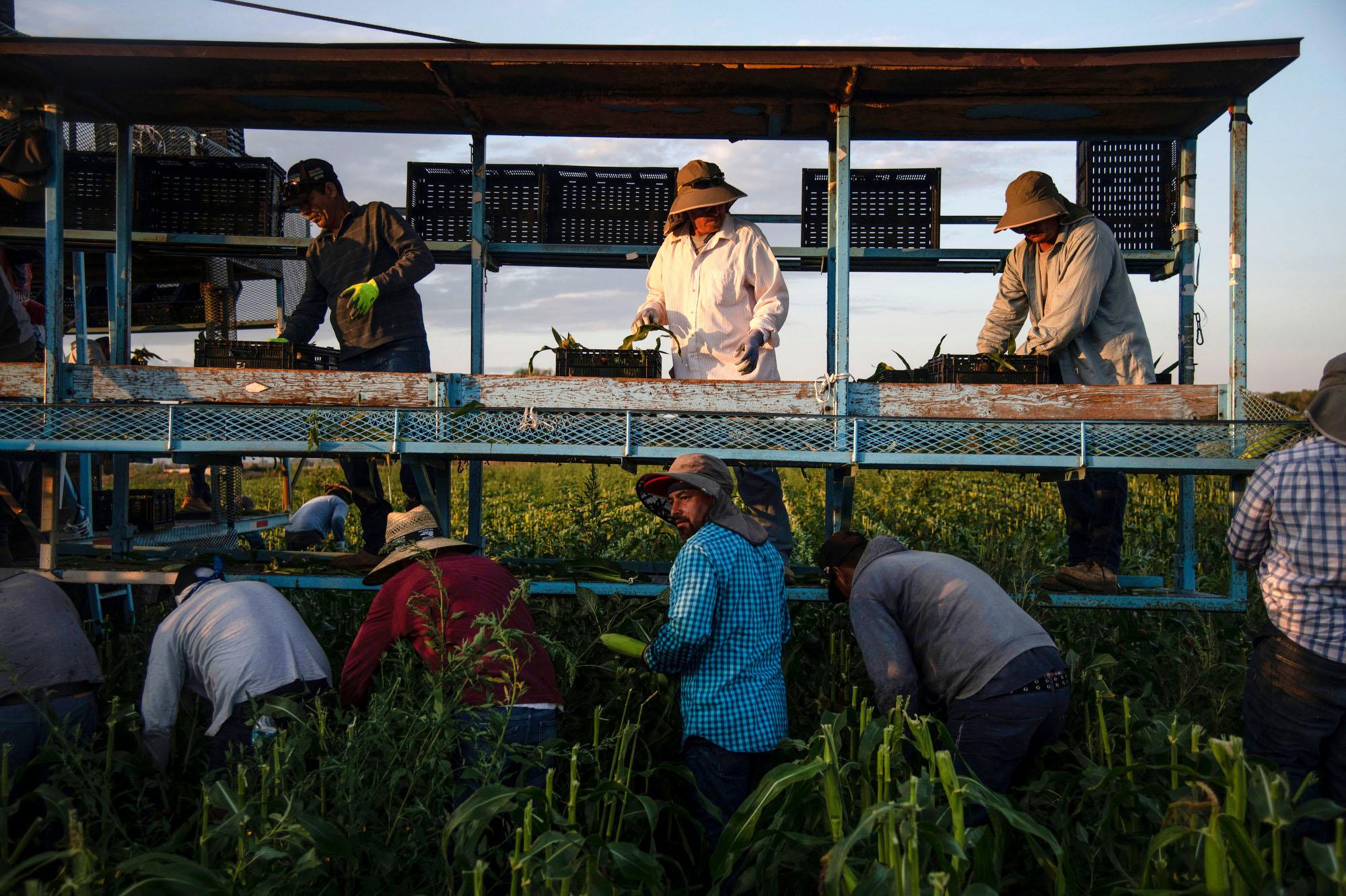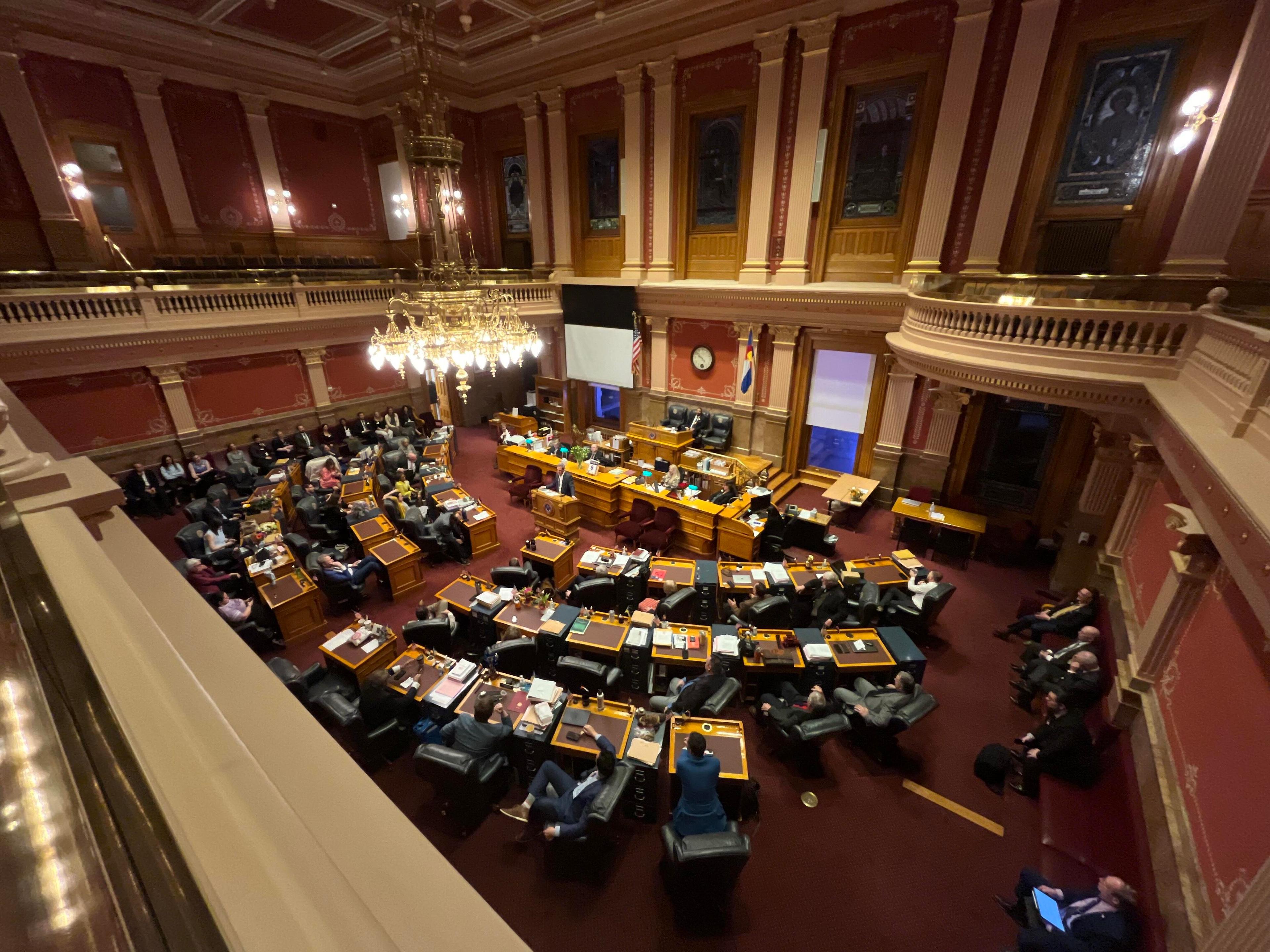
Coloradans are about to enjoy the bounty of the summer: Rocky Ford melons, Palisade peaches, and Olathe sweet corn.
But the farmers who grow that produce have a big problem. There just aren’t enough workers.
“I cannot find domestic workers who want to work seasonally at any price,” said David Harold of the Tuxedo Corn Company in Olathe. He and his father grow a variety of crops on their 1,300-plus acre farm, including the sweet corn that’s put Olathe on the map.
The tender kernels on those cobs require some delicate handling. In fact, those cobs have to be hand-picked. And the lack of labor is a constant worry.
“I don’t see how we will be able to continue to operate how we have traditionally operated,” said Harold. “But what scares me is not operating. Not being able to continue.”
The problem may be especially acute with a crop like sweet corn, but across the state, agricultural producers are struggling to find people to do the hard work of planting, weeding and harvesting. It’s a problem many believe only Congress can fix, if it can get past long-standing roadblocks.
The visa workaround looks to foreign labor
Like many other farmers, Harold relies on the H-2A visa program to bring in temporary agricultural workers. Some have been coming to work for Tuxedo Corn since he was a child.
“For them it’s relatively great pay. And for us it’s a relatively good deal because we are getting access to a labor pool that if we had to use domestic labor might cost us five times as much,” said Harold.
The federal government sets the minimum pay rate for H-2A workers in each state, to prevent farmers from offering such low wages that they automatically exclude domestic workers. In Colorado, that rate is just under $17 dollars an hour.
Still, Harold said the program is hard to use. The applications are cumbersome, farmers must provide temporary housing, and sometimes the visas are late, causing extra stress and headaches.
In addition to addressing those problems, farmers also want Congress to make some bigger tweaks, such as allowing some visa holders to stay year-round and changing how quickly minimum pay rates rise.
For workers, a life in permanent limbo
Even for the workers, the H-2A program has some downsides. The biggest one for many is that they can spend decades working in the country, without any hope of being able to permanently make it their home, at least not legally.
Juan Francisco Chavez Santana from Chihuahua, Mexico, is one of those temporary agricultural workers. He’s worked in Paonia for five seasons now, spending eight months at a time away from his wife and three daughters.
“My motivation is for the family, to get them ahead,” he said in Spanish. And he added, he’d be interested in a pathway to citizenship. Unlike the H-2A visa, permanent residency would mean his family would be able to join him.
“It would be a way to be closer together” as a family, he said.
The H-2A program has also at times left visa holders vulnerable to abuse. Most recently in Georgia, where dozens of people were indicted for human trafficking, allegedly defrauding the government out of thousands of H-2A visas while exploiting, threatening and abusing the workers.
Farm worker advocates aren’t investing a lot of effort into reforming the H-2A program, but do see supporting changes as a way to get leverage on an issue they see as more pressing: protecting workers who are here without visas.
While the H-2A program brings in tens of thousands of workers each year, it’s estimated that almost half of the agricultural workforce in America is undocumented. Advocates want to see them protected from deportation and, most importantly, given a chance for legal status. They argue it’s only fair compensation for helping secure the nation’s food supply.
“If you feed America, you deserve the right to stay in America,” said Antonio De Loera-Brust with United Farm Workers, the union that represents agricultural labor. “We believe that the undocumented farm workers who have been the backbone of the American agricultural industry for many decades deserve the chance to obtain legal status.”
One of those undocumented workers is Marisela Juarez, an undocumented worker from Georgia, who has spent the past 15 years in the U.S.
“We know that we are feeding millions of people. Even though we don’t know them, it’s a way we feel connected with them,” said Juarez at a press conference at the U.S. Capitol in December, where she and the UFW urged lawmakers to pass a compromise bill that would reform the H-2A program and provide a pathway to legal status.
“If you happen to eat anything today, it's thanks to farm workers. This is why I think it's just to have a legalization for farm workers,” she went on.
Congressional immigration inaction
To find a solution to the labor problem — to either open up the H-2A program to allow more workers or to give guest workers hope for permanent residency — would require Congress to take action on an issue it's long struggled to deal with — immigration.
While comprehensive immigration reform might be the hottest of political hot potatoes, lawmakers have shown little interest in tackling even this limited aspect of the issue.
In the last Congress, Colorado Sen. Michael Bennet tried to get the Senate to come to agreement on the Farmworker Modernization Act — a bill that passed the Democratic controlled House twice. It would have expanded the H-2A visas to allow some workers to stay in the country year-round. It also offered protections for undocumented farm workers.
“These people literally are breaking their backs to put food on the table of the American people. And I think that we should approach this negotiation with a generous view about their contribution to our country,” Bennet said.
The Farmworker Modernization Act passed the Democratic-controlled House twice, but stalled in the Senate.
With little indication that a now-divided Congress wants to take up the policy again, some producers are hoping that perhaps their concerns could be addressed by one of few must-past bills out there — the Farm Bill.
Tuxedo Corn’s Harold brought that idea up with Bennet at a recent Farm Bill listening session on the Western Slope.
“I asked him, “Can we work on labor in the Farm Bill?’ I mean, traditionally, I don't think it ever has been done,” recalled Harold. “The response was, ‘Yes, but…’”
While he may not have wanted to get Harold’s hopes up, Bennet, who serves on the Agriculture Committee, has looked into whether the issue would fit the purview of the Farm Bill, but said he’s still waiting on a firm answer from the Senate Parliamentarian.
“If there is a way to address this in the Farm Bill, to discuss it in the Farm Bill, to have a debate about this, I certainly would love it for us to do it. Because even if ultimately it can’t be addressed there, we have to keep this issue in front of the American people,” he said.
Republican Rep. Dan Newhouse of Washington is less sanguine about this approach. He’s been a leader on the issue of agricultural labor in Congress and has been willing to break with his party to support compromises. But he doesn’t think the Farm Bill is the right vehicle to get something done.
“[The] Farm Bill's already difficult to get passed… This might even make it more complicated,” he said, noting that the Judiciary Committees are the proper place to bring up immigration policies.
The Republican House has passed a border security bill that includes provisions to study the agricultural labor issue, as well as a “Sense of Congress” — basically nonbinding guidance — that the country, in using the E-Verify system to check for undocumented workers, should consider and address how it would impact the nation’s agricultural workforce.
As a farmer himself, Newhouse knows the importance of solving the agricultural labor issue. But he said in the end, public pressure might be the only thing that will push lawmakers to finally act.
“If you can't find the labor, it doesn't matter what it costs, the work is not gonna get done. People have to make sure that members of Congress understand how serious this is,” he said.
Just this week, the House Agriculture Committee formed a bipartisan working group to look at workforce challenges, with Colorado Rep. Yadira Caraveo as one of its members. Its main focus is on the H-2A visa program, with the aim of making recommendations to address the flaws.
Caraveo said in a statement that she looks forward to working on this issue “to find common ground solutions that support industry needs and address the labor issues our farmers and producers face.”
Even if the Farm Bill can’t truly tackle the challenge of agricultural labor, some farmers hope it could at least include some labor-related tweaks. For example, help with housing or even set up something to cover lost wages for farm workers due to extreme weather or failed crops.
Or use it to beef up an ongoing effort to highlight fair labor practices.
Harold is working to get into the Fair Food Program, a partnership between workers, farmers and retailers to improve conditions for farm employees. He thinks it incentivizes good outcomes without more regulations or enforcement, which is a route many states, including Colorado, are starting to take.
It’s a way to “engage with our employees and provide them — even encourage — them to speak up about what problems they have or what they would want,” he said. He’d like to see the program expanded through the Farm Bill.
“Instead of me telling you I’m a good employer, it’s my employee saying he’s a good employer,” he added.
And unlike immigration reform, this is one goal he has more hope of seeing included in the final Farm Bill.
Stephanie Rivera contributed to this story








